| Taipei Economic and Cultural Representative Office | |||||||||||||||||
|---|---|---|---|---|---|---|---|---|---|---|---|---|---|---|---|---|---|
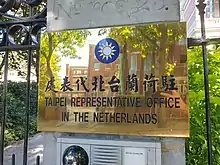 | |||||||||||||||||
| Traditional Chinese | 臺北經濟文化辦事處 | ||||||||||||||||
| Simplified Chinese | 台北经济文化办事处 | ||||||||||||||||
| |||||||||||||||||
The Taipei Economic and Cultural Representative Office (TECRO), also known as Taipei Economic and Cultural Office (TECO), Taipei Representative Office (TRO) or Taipei Mission, is an alternative diplomatic institution serving as a de facto embassy or a consulate of the Republic of China (ROC, commonly referred to as Taiwan) to exercise the foreign affairs and consular services in specific countries which have established formal diplomatic relations with the People's Republic of China (PRC, commonly referred to as China). As the PRC denies the legitimacy of the ROC as a sovereign state and claims the ROC-controlled territories as an integral part of its China. An exclusive mandate namely One-China policy, mandates any country that wishes to establish a diplomatic relationship with the PRC must first sever any formal relationship with the ROC. According to The Fletcher Forum of World Affairs, "non-recognition of the Taiwanese government is a prerequisite for conducting formal diplomatic relations with the PRC—in effect forcing other governments to choose between Beijing and Taipei."[1][2] As a result, these countries only allow the ROC to establish representative offices instead of a fully-fledged embassy or consulate for the purpose of conducting practical bilateral relations without granting full diplomatic recognition.
Except in the Fiji (renamed 2023), Papua New Guinea, Oman, Somaliland (opened 2020), United States and Japan, these establishments use the capital city "Taipei" and refrain from using names of "Taiwan", "ROC" or even the term "Nationalist China" (named after the ruling party Kuomintang during Cold War period) since the term "Taipei" avoids implying that Taiwan is a different country on par with the PRC or that there are "Two Chinas", the PRC and the ROC, in order to diminish the obstacles of building pragmatic diplomacy and sidestep the Taiwan issue. Lithuania broke the tradition with the name Taiwanese Representative Office in Lithuania in 2021. As a result, the PRC downgraded its relations with Lithuania to the charge d'affaires level and expelled its embassy staff from Beijing.[3]
TECROs state that their aim is "to promote bilateral trade, investment, culture, science and technology exchanges and cooperation, as well as better understanding", and provide common citizen services towards overseas Taiwanese, such as issuing visas and passports.
TECROs in the United States enjoy many diplomatic privileges such as extraterritoriality, providing consular protection and their staff have diplomatic immunity.[4] Other countries also establish reciprocal representative offices in Taiwan, such as the American Institute in Taiwan, Canadian Trade Office in Taipei and Japan–Taiwan Exchange Association.
History
Following the admission of the PRC to the United Nations in 1971, many countries began to establish diplomatic relations with the government in Beijing, and as a consequence, ended diplomatic relations with the Nanjing-based ROC Government stationed in Taipei.[5] In order to maintain trade and cultural ties with countries with which it no longer had diplomatic relations, Taiwan established representative offices in these countries, often replacing its former embassies.
Before the 1990s, the names of these offices would vary considerably from country to country, usually omitting any reference to "Taiwan" or "Republic of China", instead referring to "East Asia", "Far East" or "Free China".[6] They would also describe themselves as "centres" or "offices", concerned with trade, tourism, culture or information, thereby emphasising their private and unofficial status, despite being staffed by Ministry of Foreign Affairs personnel.
For example, in Japan, the former ROC Embassy was replaced by the "Association of East Asian Relations" (AEAR) in 1972.[7] In Malaysia, following the closure of the Consulate General in Kuala Lumpur in 1974, an office known as the Far East Travel and Trade Centre was established.[8] In the Philippines, the former Embassy in Manila was replaced by the "Pacific Economic and Cultural Center", established in 1975.[7] In Thailand, the former Embassy in Bangkok was replaced by the "Office of the Representative of China Airlines" in 1975.[9] This was later renamed the Far East Trade Office in 1980.[8]
In the United States, Taipei's mission, established in 1979, was known as the "Coordination Council for North American Affairs" (CCNAA).[10] As of 2019, it has been renamed "Taiwan Council for US Affairs."[11]
In the United Kingdom, Taiwan was represented by the "Free Chinese Centre", established in 1963.[12] In West Germany, it was represented by a Büro der Fernost-Informationen ("Far East Information Office") established in 1972.[13] In Spain, the office, established in 1973, was known as the Centro Sun Yat-sen ("Sun Yat-sen Centre").[14] In the Netherlands, the office was known as the "Far East Trade Office".[14]
However, in the late 1980s, these offices began using the name "Taipei" in their titles. In May 1992, the AEAR offices in Japan became Taipei Economic and Cultural Representative Offices.[15] The "Free Chinese Centre" in London was similarly renamed the "Taipei Representative Office".[16] In September 1994, the Clinton Administration announced that the CCNAA office in Washington could similarly be called the Taipei Economic and Cultural Representative Office.[17]
Earlier in 1989, the "Pacific Economic and Cultural Center" in Manila became the "Taipei Economic and Cultural Office in the Philippines".[18] In 1991, the "Taiwan Marketing Service" office in Canberra, Australia, established in 1988, also became a "Taipei Economic and Cultural Office", along with the "Far East Trading Company" offices in Sydney and Melbourne.[19]
Other names are still used elsewhere; for example, the mission in Moscow is formally known as the "Representative Office in Moscow for the Taipei-Moscow Economic and Cultural Coordination Commission",[20] the mission in New Delhi is known as the "Taipei Economic and Cultural Center".[21] The mission in Pretoria is known as the "Taipei Liaison Office".[22]
The two most recent ones to change their official names, in Papua New Guinea and in Jordan, both use the name Taipei Economic and Cultural Office (Chinese: 臺北經濟文化辦事處).
TECRO in the United States
Originally called the Coordination Council for North American Affairs (CCNAA), the name of the CCNAA office in Washington, D.C. (the "embassy") was changed to "Taipei Economic and Cultural Representative Office" (TECRO) as a result of the Clinton administration's Taiwan Policy Review of 1994.[17] Similarly, the names of the twelve other CCNAA offices ("consulates") in the United States were changed to "Taipei Economic and Cultural Office" (TECO).[23]
On May 24, 2019, Taiwan informed that "the Coordination Council for North American Affairs" was renamed "the Taiwan Council for U.S. Affairs".[24]
In September 2020, the US Ambassador to the United Nations Kelly Craft met with James K.J. Lee, director-general of the Taipei Economic and Cultural Office in New York, who was secretary-general in Taiwan's Ministry of Foreign Affairs until July, for lunch in New York City in what was the first meeting between a top Taiwan official and a United States ambassador to the United Nations.[25] Craft said she and Lee discussed ways the US can help Taiwan become more engaged within the U.N., and she pointed to a December 2019 email alert from Taiwan that WHO had ignored, recognizing and warning about the danger of the person-to-person transmission of the new highly contagious COVID-19 virus in China.[25]
TECRO in Japan

Diplomatic relations between the Republic of China and Japan were broken off in September 1972. For practical reasons, the Association of East Asian Relations (AEAR), was established two months after the Japan-China Joint Communique was signed. EARA had offices in Taipei, Tokyo, Osaka, and Fukuoka.[26] In 1992, Japan authorized the change in name of AEAR to TECRO.[27]
Representations in the PRC special administrative regions
Hong Kong
In Hong Kong, from 1966, Taiwan was represented by the 'Chung Hwa Travel Service', a name chosen to avoid upsetting Beijing.[28] On 20 July 2011, as a result of warming relations between Taiwan and Beijing, the name was formally changed to the Taipei Economic and Cultural Office, bringing it into line with other Republic of China representative offices around the world.[29]
Macau
In Macau, from 1989 to 1999, Taiwan was represented by the 'Taipei Trade and Tourism Office', Taiwan's first-time representation in Macau after Kuomintang's expulsion from Macau as the consequence of the December 3rd Incident in 1966. From 1999 to 2011, Taiwan was represented by the 'Taipei Economic and Cultural Center'. On 13 May 2012, the name was formally changed to the Taipei Economic and Cultural Office.[30]
TRO in the United Kingdom
In 1950, the UK switched recognition from the Republic of China to the People's Republic of China (PRC) shortly after its establishment, while maintaining the British Consulate in Tamsui, through which the UK continued to carry out consular and trade-related activities. The Consulate was closed after the UK and the PRC upgraded relations to Ambassadorial level in March 1972, and in June 1980 the building and land of the Consulate were returned to the Taiwanese government. The ROC government's office in the UK was set up in September 1963, and at the time was known as the Free Chinese Centre.[12] In 1992, this was revised to become the Taipei Representative Office in the UK.[31]
Taipei Representative Office in Norway
| Agency overview | |
|---|---|
| Formed | 1980 (as Taipei Trade Centre)[14] |
| Dissolved | 30 September 2017 |
| Headquarters | Oslo, Norway |
The Taipei Representative Office in Norway; (Chinese: 駐挪威代表處; pinyin: Zhù Nuówēi Dàibiǎo Chù) was a diplomatic mission of Taiwan to Norway that functioned as a de facto embassy. The first representative office of Taiwan in Norway was the Taipei Trade Centre, established in 1980.[32]
In July 2017, the ROC Ministry of Foreign Affairs announced that the office will be suspended on 30 September 2017 and affairs related to Taiwanese in the country will be handled by Taipei Mission in Sweden. The decision was made to improve the efficiency of the foreign diplomatic missions of Taiwan.[33]
Taipei representative offices around the world
The list below shows the countries or regions where TECROs/TROs are established.
G20 nations
Other countries
Former representative offices
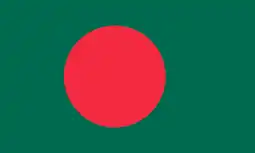 Bangladesh — Taipei Economic and Cultural Office in Bangladesh (closed in 2009, transferred to Taipei Economic and Cultural Center in India and in Thailand)
Bangladesh — Taipei Economic and Cultural Office in Bangladesh (closed in 2009, transferred to Taipei Economic and Cultural Center in India and in Thailand)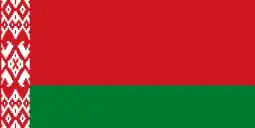 Belarus — de facto embassy in Minsk (closed in 2006, transferred to Representative Office in Moscow for the Taipei-Moscow Economic and Cultural Coordination Commission)
Belarus — de facto embassy in Minsk (closed in 2006, transferred to Representative Office in Moscow for the Taipei-Moscow Economic and Cultural Coordination Commission).svg.png.webp) Bolivia — Taipei Economic Office in La Paz (closed in 2009, transferred to Taipei Economic and Cultural Office in Peru)
Bolivia — Taipei Economic Office in La Paz (closed in 2009, transferred to Taipei Economic and Cultural Office in Peru)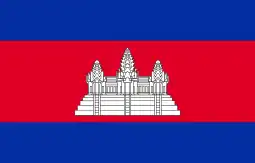 Cambodia — de facto embassy in Phnom Penh (closed in 1997, transferred later to Taipei Economic and Cultural Office, Ho Chi Minh City)
Cambodia — de facto embassy in Phnom Penh (closed in 1997, transferred later to Taipei Economic and Cultural Office, Ho Chi Minh City)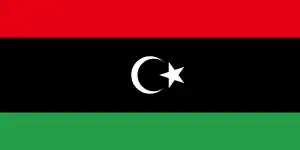 Libya — Taiwan Commercial Office in Tripoli (closed in 2011, transferred to Taipei Economic and Cultural Office in Jordan)
Libya — Taiwan Commercial Office in Tripoli (closed in 2011, transferred to Taipei Economic and Cultural Office in Jordan) Norway — Taipei Representative Office in Norway (closed in 2017, transferred to Taipei Mission in Sweden)
Norway — Taipei Representative Office in Norway (closed in 2017, transferred to Taipei Mission in Sweden)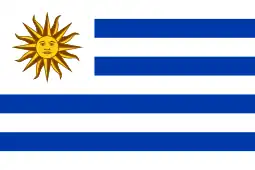 Uruguay — Taipei Economic Office in Montevideo (closed in 2002 temporary, transferred to Taipei Economic and Cultural Office in Argentina)
Uruguay — Taipei Economic Office in Montevideo (closed in 2002 temporary, transferred to Taipei Economic and Cultural Office in Argentina) Venezuela — Taipei Economic Office in Caracas (closed in 2009, transferred to Taipei Commercial Office in Bogotá, Colombia)
Venezuela — Taipei Economic Office in Caracas (closed in 2009, transferred to Taipei Commercial Office in Bogotá, Colombia)
See also
References
- ↑ Erikson, Daniel P.; Chen, Janice (2007). "China, Taiwan, and the Battle for Latin America". The Fletcher Forum of World Affairs. 31 (2): 71.
- ↑ "The One-China Principle and the Taiwan Issue". China Internet Information Center. Archived from the original on 2019-02-27. Retrieved 2014-04-09.
- ↑ "China downgrades Lithuania's diplomatic status over Taiwan row". 21 November 2021. Archived from the original on 18 December 2022. Retrieved 18 December 2022.
- ↑ New US diplomatic immunity pact a breakthrough: MOFA Archived 2016-10-21 at the Wayback Machine, The China Post, February 6, 2013
- ↑ The Road Less Traveled Archived 2016-03-14 at the Wayback Machine, Taiwan Review, September 1, 2002
- ↑ China and Europe Since 1978: A European Perspective Archived 2017-08-22 at the Wayback Machine, Richard L. Edmonds, Cambridge University Press, 2002, page 141
- 1 2 International Law of Recognition and the Status of the Republic of China Archived 2016-02-25 at the Wayback Machine, Hungdah Chiu, in The United States and the Republic of China: Democratic Friends, Strategic Allies, and Economic Partners, Steven W. Mosher Transaction Publishers, 1992, page 24
- 1 2 Foreign Policy of the New Taiwan: Pragmatic Diplomacy in Southeast Asia Archived 2016-03-13 at the Wayback Machine, Jie Chen, Edward Elgar Publishing, 2002, page 82
- ↑ The Changing Political Economy of Taiwan's and China's Relations with Southeast Asia: A Comparative Perspective Archived 2016-03-13 at the Wayback Machine, Samuel C Y Ku in China and Southeast Asia: Global Changes and Regional Challenge, Ho Khai Leong, Samuel C Y Ku, Institute of Southeast Asian Studies, 2005, page 259
- ↑ Memorandum of Understanding between the American Institute in Taiwan and the Coordination Council for North American Affairs on the Exchange of Information Concerning Commodity Futures and Options Matters Archived 2016-12-21 at the Wayback Machine, Signed at Arlington, Virginia this 11th day of January 1993
- ↑ "Taiwan changes name of office in the U.S. To ... | Taiwan News". 25 May 2019. Archived from the original on 2019-05-27. Retrieved 2019-05-27.
- 1 2 The Cold War's Odd Couple: The Unintended Partnership Between the Republic of China and the UK, 1950–1958 Archived 2016-02-24 at the Wayback Machine, Steven Tsang, I.B.Tauris, 2006, page 39
- ↑ Die Beziehungen zwischen Taiwan und Deutschland, Taipeh Vertretung in der Bundesrepublik Deutschland
- 1 2 3 Pretence of Privatisation: Taiwan's External Relations Archived 2016-03-14 at the Wayback Machine, Françoise Mengin, in Privatising the State, Béatrice Hibou, C. Hurst & Co. Publishers, 2004, pages 154
- ↑ Republic of China Yearbook Archived 2016-02-24 at the Wayback Machine Kwang Hwa Publishing Company, 1998, 145
- ↑ Former diplomats to Great Britain remember Thatcher Archived 2016-02-03 at the Wayback Machine, The China Post, 10 April 2013
- 1 2 Taiwan's Relations with Mainland China: A Tail Wagging Two Dogs Archived 2016-02-08 at the Wayback Machine, Chi Su Routledge, 2008, page 31
- ↑ Ensuring Interests: Dynamics of China-Taiwan Relations and Southeast Asia Archived 2017-02-02 at the Wayback Machine, Khai Leong Ho, Guozhong He, Institute of China Studies, University of Malaya, 2006, page 25
- ↑ Australia and China: Partners in Asia Archived 2016-03-09 at the Wayback Machine, Colin Mackerras, Macmillan Education, 1996, page 33
- ↑ 外交部 (9 January 2015). "中華民國(台灣)外交部全球資訊網". 中華民國外交部 - 全球資訊網 Ministry of Foreign Affairs, Republic of China (Taiwan). Archived from the original on 14 November 2017. Retrieved 1 April 2018.
- ↑ MoU between India-Taipei Association (ITA) in Taipei and Taipei Economic and Cultural Center (TECC) in India on cooperation in the field of Micro, Small and Medium Enterprises Archived 2016-02-05 at the Wayback Machine, Press Information Bureau, Government of India, Cabinet, 14 October 2015
- ↑ Team, Internet. "首頁 - 駐南非共和國台北聯絡代表處 Taipei Liaison Office in the RSA". www.roc-taiwan.org. Archived from the original on 2016-03-10. Retrieved 2016-03-13.
- ↑ "1994 Taiwan Policy Review Archived 2007-04-04 at the Wayback Machine." Formosan Association for Public Affairs. Retrieved on January 28, 2009.
- ↑ "Taiwan changing name of de-facto embassy in US". The Washington Post.
- 1 2 "US envoy to United Nations meets with Taiwan official in NY". ABC News. Archived from the original on 2021-02-06. Retrieved 2021-06-23.
- ↑ The International Law of Recognition and the Status of the Republic of China Archived 2016-03-09 at the Wayback Machine, Hungdah Chiu in The United States and the Republic of China: Democratic Friends, Strategic Allies, and Economic Partners, Steven W. Mosher, Transaction Publishers, 1992, page 24
- ↑ Republic of China Yearbook. Kwang Hwa Publishing Company. 1998. p. 145. ISBN 9789570211795. Archived from the original on 2016-03-09. Retrieved 2016-02-23.
- ↑ Is name change a game changer? Archived 2016-03-03 at the Wayback Machine, Taipei Times, 17 July 2011
- ↑ Taiwan changes name of HK office Archived 2012-10-02 at the Wayback Machine, RTHK News, 15 July 2011
- ↑ Macau representative office in Taiwan opens Archived 2015-04-05 at the Wayback Machine The China Post, May 14, 2012
- ↑ Former diplomats to Great Britain remember Thatcher Archived 2016-02-03 at the Wayback Machine, China Post, 10 April 2013
- ↑ A Pretence of Privatisation: Taiwan's External Relations Archived 2016-03-14 at the Wayback Machine, Françoise Mengin, in Privatising the State, Béatrice Hibou, C. Hurst & Co. Publishers, 2004, pages 154
- ↑ Hou, Elaine (27 July 2017). "Taiwan suspending operations at 3 overseas offices". Focus Taiwan. Archived from the original on 27 July 2017. Retrieved 28 July 2017.
- ↑ Team, Internet. "Le Représentant de Taïwan en France". Bureau de Représentation de Taipei en France 駐法國台北代表處. Archived from the original on 2016-10-18. Retrieved 2016-10-18.
- ↑ "Activity Highlights". Eccpc.org.hk. Archived from the original on 2013-10-23. Retrieved 2014-06-09.
- ↑ "Taiwan's new representative to Israel to assume duties this week | Politics | FOCUS TAIWAN - CNA ENGLISH NEWS". Focustaiwan.tw. Archived from the original on 2014-04-04. Retrieved 2014-06-09.
- ↑ "Taiwan's man in Macau has creative approach". Macau Business Daily. Archived from the original on 2013-10-19. Retrieved 2014-06-09.
- ↑ "駐緬甸代表訪問緬北僑社及僑校". 駐緬甸台北經濟文化辦事處 (Taipei Economic and Cultural Office in Myanmar). Archived from the original on 2018-12-26. Retrieved 2018-12-26.
- ↑ Two diplomats sworn in before departing for Poland, India Archived 2015-07-10 at the Wayback Machine, Focus Taiwan, July 8, 2015
Further reading
- Pajtinka, Erik (31 July 2007). "Between Diplomacy and Paradiplomacy: Taiwan's Foreign Relations in Current Practice". Journal of Nationalism, Memory & Language Politics. 11 (1).

.jpg.webp)